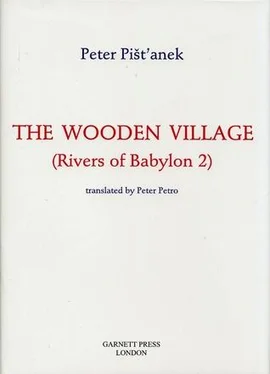Peter Pišťanek - The Wooden Village
Здесь есть возможность читать онлайн «Peter Pišťanek - The Wooden Village» весь текст электронной книги совершенно бесплатно (целиком полную версию без сокращений). В некоторых случаях можно слушать аудио, скачать через торрент в формате fb2 и присутствует краткое содержание. Год выпуска: 2008, Издательство: Garnett Press, Жанр: Современная проза, на английском языке. Описание произведения, (предисловие) а так же отзывы посетителей доступны на портале библиотеки ЛибКат.
- Название:The Wooden Village
- Автор:
- Издательство:Garnett Press
- Жанр:
- Год:2008
- ISBN:нет данных
- Рейтинг книги:3 / 5. Голосов: 1
-
Избранное:Добавить в избранное
- Отзывы:
-
Ваша оценка:
- 60
- 1
- 2
- 3
- 4
- 5
The Wooden Village: краткое содержание, описание и аннотация
Предлагаем к чтению аннотацию, описание, краткое содержание или предисловие (зависит от того, что написал сам автор книги «The Wooden Village»). Если вы не нашли необходимую информацию о книге — напишите в комментариях, мы постараемся отыскать её.
The Wooden Village — читать онлайн бесплатно полную книгу (весь текст) целиком
Ниже представлен текст книги, разбитый по страницам. Система сохранения места последней прочитанной страницы, позволяет с удобством читать онлайн бесплатно книгу «The Wooden Village», без необходимости каждый раз заново искать на чём Вы остановились. Поставьте закладку, и сможете в любой момент перейти на страницу, на которой закончили чтение.
Интервал:
Закладка:
Peter Pišťanek
The Wooden Village
Introduction
Introduction Peter Pišťanek (pronounced Pishtyanek ) is one of the most talented prose writers to appear after the fall of Communism in Slovakia. He is also a colourful and controversial personality whose many-sided activities were unthinkable in the Communist era. He was born in 1960 in Devínska Nová Ves, a village now swallowed up by Bratislava, the capital of Slovakia. He enrolled in Bratislava’s Academy of Performing Arts, but did not graduate. He was also a drummer in a very well known rock group. At the end of the 1980s he began to publish in the literary monthly Slovenské Pohľady (Slovak Views). His breakthrough came with Rivers of Babylon (1991, English publication 2007 by Garnett Press), a novel that caused a sensation and catapulted him into fame. Followed by The Wooden Village and The End of Freddy (the latter published by Garnett Press in tandem with this novel), Rivers of Babylon has become a trilogy. Since the end of the 1990s Peter Pišťanek has worked for advertising agencies and edited an influential Internet magazine Inzine . He has also become something of an expert on brandies and whiskies.
Pišťanek’s reputation is assured by the originality, fine craftsmanship and imaginative inventiveness of Rivers of Babylon and the rest of the trilogy. This second novel develops the story of the anti-hero of the first, Rácz, an unstoppable idiot of genius, a gangster with no conscience, but centres the plot on a secondary character from the first novel Freddy Piggybank, a sexually troubled car park attendant, who finds his path to happiness opened by the wild freedoms of the early nineties, and a new character, an emigré returning from America to an unrecognizable homeland. Pišťanek’s black humour is now tempered with a gentle, only slightly ironic romanticism.
The Wooden Village , a cluster of kiosks in an old car park, chronicles the chaotic licentiousness of morals and commerce in a Slovakia where corruption and opportunism is masked as ‘democracy’.
Today’s Slovak readers acknowledge Peter Pišťanek as the country’s most flamboyant and fearless writer, though many are shocked by his iconoclasm. A literature that once showed the Slovaks as a nation of wise bee-keepers and virtuous matriarchs now presents the nation stripped of its myths and false self-esteem. The Wooden Village carries on a process of demythologisation.
Some guidance for the British reader…
Time and place
The novel is set in 1992, when the Slovaks are breaking away from the Czechs to achieve independence, and anything goes. Most of the action takes place in the capital, Bratislava, then the capital of a Slovakia which was still part of Czechoslovakia. Other scenes of the novel are in Nová Ves, a village, now a suburb of Bratislava, and on the Hungarian-speaking countryside from where the dreaded Rácz and the unhappy Bartaloš couple originate.
The currency is the Slovak crown, then worth 50 to the pound sterling.
Some characters and how to pronounce their names
We have decided to keep Slovak spellings of characters’ names, but here is a guide to pronouncing the more problematic and important ones. All names are stressed on the first syllable:
Rácz, Businessman of the Year pronounce as Rahts
Junec, a Slovak emigrant in the USA Yoonets
Mešťánek, Freddy Piggybank’s real name Meshtyanek
Kišš, the village butcher Kish
Eržika, his daughter Air-s[ as in pleasure ]ika
Bartaloš, Eržika’s husband Bartalosh
Šípoš, a gypsy stoker Shiposh
Mozoň, ex-secret policeman Mozogne [ n as in Boulogne ]
Šolik, ex-secret policeman Sholik
Peter Petro and Donald Rayfield
The Wooden Village
For Maria and Tomáš Kaluba
~ ~ ~
Those of my dear readers who happen to have read my novel Rivers of Babylon have a right to wonder if this book might begin by not mentioning Mr Rácz. They are right: Mr Rácz is not going to be the subject. At least not as much as any reader spoiled by the first book might expect.
But perhaps I may be allowed to reveal a thing or two about Rácz’s private and professional life.
Mr Rácz is pleased with life and is happily married. He is proud of his healthy son; he is doing well, and wants to use this opportunity to say hello to all his well-wishers. Both his hotels, his line of restaurants, his investment fund Oxford Captivate & Consumption, his real estate company X-Racio and his private security service Sekuritatia are all prospering. Quite recently Mr Rácz acquired a large hangar on two hectares of land in the grounds of the commercial port, where he intends to open a duty-free warehouse. All of this will depend on the internal convertibility of the Slovak crown. Moreover, Mr Rácz has founded a new division of his Sekuritatia firm, specialising in recovering difficult debts.
For example: you’re a businessman. A company owes you money. You send them an invoice, a reminder invoice, a final reminder etc, and they still won’t pay. So you contact the people from Sekuritatia and they buy your debt. Clear now? Other businessmen buy goods and stocks, but Rácz buys debt, too — just to keep business turning over. For an apparently irrecoverable debt of, say, half a million crowns, he will give you in cash a full four hundred thousand, that is, eighty per cent of the sum due. You go away satisfied and you light a candle in the nearest church praying that the Great Benefactor Rácz will live at least a hundred years.
While the candles are burning, Šolík and Tupý, employed by Sekuritatia ever since it was founded, do fieldwork to find out about the debtor’s company: what the owner’s or owners’ names are, where they live, what cars they own and where they’re parked, if they have a family, children and their ages and schools, if they have pets (a dog or a cat is ideal — we haven’t reached the stage of a severed horse head on a pillow) and where they walk them. When they have this information, they go back to the Sekuritatia office and give a detailed report to their chief, Mozoň. A meeting then takes place. Afterwards, as they say, they get going.
The whole operation usually proceeds on identical lines.
Like this: a beautiful eight-year old little girl, angelic, with long blonde hair, a daughter of the owner of the company in debt, is walking home from school. A huge car stops by her and a nice uncle offers her sweets. She’s asked if she’d like to be taken home, to such and such an address. The little girl is surprised that the nice uncle knows her address. The uncle laughs. The nice uncle is an old friend of Daddy’s. The little girl gets in the car; her movements already give an embryonic, but very lovely hint of the charm with which she will one day get into other uncles’ cars.
The nice uncle asks about the dog: do they still have the same dachshund?
The girls nods, yes, they have a little dog, he’s called Satchmo.
“And here we are, Miss,” the nice uncle says, as he stops in front of her house. “This is how to open the door. You can take all those sweets, they’re bad for me, I’ve got diabetes,” says the nice uncle. “One more thing,” he adds, “I almost forgot: please give this to Daddy and say hello to him from me.”
The little girl takes the envelope and sweets, says thank you nicely, with the charm we have described, and gets out of the car. She waves to the nice uncle and then vanishes in the doorway.
Читать дальшеИнтервал:
Закладка:
Похожие книги на «The Wooden Village»
Представляем Вашему вниманию похожие книги на «The Wooden Village» списком для выбора. Мы отобрали схожую по названию и смыслу литературу в надежде предоставить читателям больше вариантов отыскать новые, интересные, ещё непрочитанные произведения.
Обсуждение, отзывы о книге «The Wooden Village» и просто собственные мнения читателей. Оставьте ваши комментарии, напишите, что Вы думаете о произведении, его смысле или главных героях. Укажите что конкретно понравилось, а что нет, и почему Вы так считаете.












